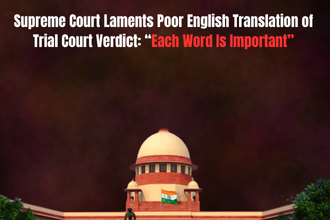In a sharp reminder of the importance of precision in legal language, the Supreme Court of India has expressed serious dissatisfaction with the poor English translation of a trial court judgment, emphasizing that every word, comma, and nuance in judicial documents carries immense significance.
The Bench comprising Justice Sanjay Karol and Justice PK Mishra made these observations in the case Zoharbee and Another v. Imam Khan (deceased) through Legal Representatives & Ors., while hearing a long-standing family property dispute.
“In Matters of Law, Words Are of Indispensable Importance”: Supreme Court
The apex court criticized the quality of the English translation of the civil court’s judgment, stating that inaccurate or careless translations can distort the meaning and intent of legal reasoning.
“We record our dissatisfaction with the manner in which the judgment of the learned civil court was translated into English. In matters of law, words are of indispensable importance. Each word, every comma has an impact on the overall understanding of the matter. Due care has to be taken to ensure that the true meaning and spirit of the words in the original language are translated into English for the courts in appeal to comprehend what had transpired below,” the Court observed.
This observation serves as a cautionary note to all subordinate courts and translation authorities, reinforcing that legal translation is not merely linguistic conversion but a transfer of meaning and intent, where precision is paramount.
The Dispute: Division of Property Between Widow and Brother
The case arose from a family dispute over the estate of late Chand Khan, whose widow, Zoharbee, approached the courts claiming her share in his property.
Zoharbee contended that the entire estate left behind by her husband constituted matruka property — that is, property left by a deceased Muslim to be distributed among legal heirs according to Mohammedan Law of Inheritance.
She asserted that since Chand Khan died childless, she was entitled to three-fourths of the total property, leaving one-fourth for his brother, Imam Khan, as per the principles of inheritance applicable under Muslim law.
Respondent’s Argument: Property Already Transferred
Imam Khan, however, disputed her claim. He argued that during Chand Khan’s lifetime, portions of the property had already been transferred to third parties or sold, and therefore, no property remained to be partitioned as matruka after his death.
According to the respondent, Chand Khan had entered into agreements to sell some property, with part of the payment received during his lifetime and the rest thereafter. Thus, he argued that ownership had effectively been transferred before the deceased’s death.
Supreme Court Clarifies: Agreement to Sell Does Not Transfer Ownership
Rejecting this argument, the Supreme Court clarified the law under Section 54 of the Transfer of Property Act, 1882, which defines a sale and distinguishes it from an agreement to sell.
The Court held that an agreement to sell, by itself, does not transfer ownership of immovable property — ownership passes only upon execution and registration of a valid sale deed.
“An agreement to sell does not automatically transfer ownership of immovable property. Since no registered sale deed was executed, Chand Khan remained the owner until his death,” the Court observed.
Consequently, the property formed part of the matruka, and hence was liable to be divided among legal heirs in accordance with Muslim Personal Law.
Interpretation of Muslim Law of Inheritance
The Supreme Court proceeded to interpret the principles of Muslim inheritance law, referring to Chapter IV, Verse 12 of the Qur’an, which clearly delineates the widow’s share in her husband’s property.
“Principles of Muslim Law of inheritance depict that the sharers are entitled to a prescribed share of the inheritance and wife being a sharer is entitled to 1/8th share, but where there is no child or child of a son how low so ever, the share to which the wife is entitled is 1/4th,” the judgment explained.
Since Chand Khan died without children, the Court held that Zoharbee was entitled to one-fourth of the property, with the remaining portion passing to other legal heirs, including the brother, Imam Khan.
Court’s Displeasure on Translation: A Broader Institutional Concern
While the case revolved around property division under Muslim law, the Supreme Court’s most striking remarks were directed toward the quality of translations of lower court judgments.
The Bench noted that inaccurate English translations of judgments originally written in regional languages hinder the appellate process, causing confusion and sometimes altering the essence of the judgment.
Justice Karol and Justice Mishra stressed that such errors can have serious implications on justice delivery, especially in appeals and reviews, where higher courts depend on accurate records of trial proceedings.
“Due care has to be taken to ensure that the true meaning and spirit of the words in the original language are translated into English for the courts in appeal to comprehend what had transpired below,” the Court reiterated.
Significance of the Ruling: Preserving the Precision of Legal Language
The Supreme Court’s observations underscore the critical role of language in law — where every word, punctuation, and expression can influence legal interpretation and judicial outcomes.
Legal experts note that this case reflects a systemic issue in Indian courts, where judgments written in vernacular languages are often poorly translated, leading to semantic distortions in higher appeals.
Key Takeaways:
- Translation is integral to justice delivery. Poor translations can distort facts, reasoning, and intent of lower court decisions.
- Legal terminology demands contextual accuracy. Every word in a judgment carries interpretative weight.
- Judicial directions highlight need for professional translators. Courts may need to employ trained legal linguists or certified translators to prevent miscarriages of justice.
- Language reflects the spirit of justice. The accuracy of legal records ensures consistency in interpretation across judicial hierarchies.
Broader Context: Need for Translation Reforms in Indian Judiciary
The Indian judiciary operates in multiple languages across states. Trial courts often deliver judgments in regional languages, which must then be translated into English for appeals before the High Courts or the Supreme Court.
However, these translations are frequently performed by court staff or non-specialists, leading to errors in nuance, tone, and meaning.
The Supreme Court’s concern in Zoharbee v. Imam Khan thus revives an ongoing debate on the need for institutional reforms, including:
- Establishing dedicated translation cells in each High Court;
- Implementing quality control protocols for legal translations;
- Using AI-assisted legal translation tools vetted by judicial experts; and
- Introducing certification standards for legal translators.
Such measures could help preserve the fidelity of legal documents and ensure linguistic consistency in India’s multilingual judicial system.
Conclusion
The Supreme Court’s ruling in Zoharbee v. Imam Khan is a reminder that justice is as much about language as it is about law. Each word in a legal document carries interpretive power, and any mistranslation risks undermining the fairness of judicial outcomes.
By emphasizing that “each word is important”, the Court has not only resolved a family inheritance dispute but also issued a clarion call for reform — urging courts, translators, and administrators to treat legal language with the respect and precision it deserves.
As India continues to modernize its judicial infrastructure, this ruling could pave the way for a national framework for legal translation standards, ensuring that the spirit of justice is never lost in translation.
Also Read
BCCI Supports Criminalization of Match-Fixing; Seeks Intervention in Supreme Court Case
Supreme Court Refuses to Intervene in Telangana HC Order Staying OBC Quota Hike in Local Bodies



